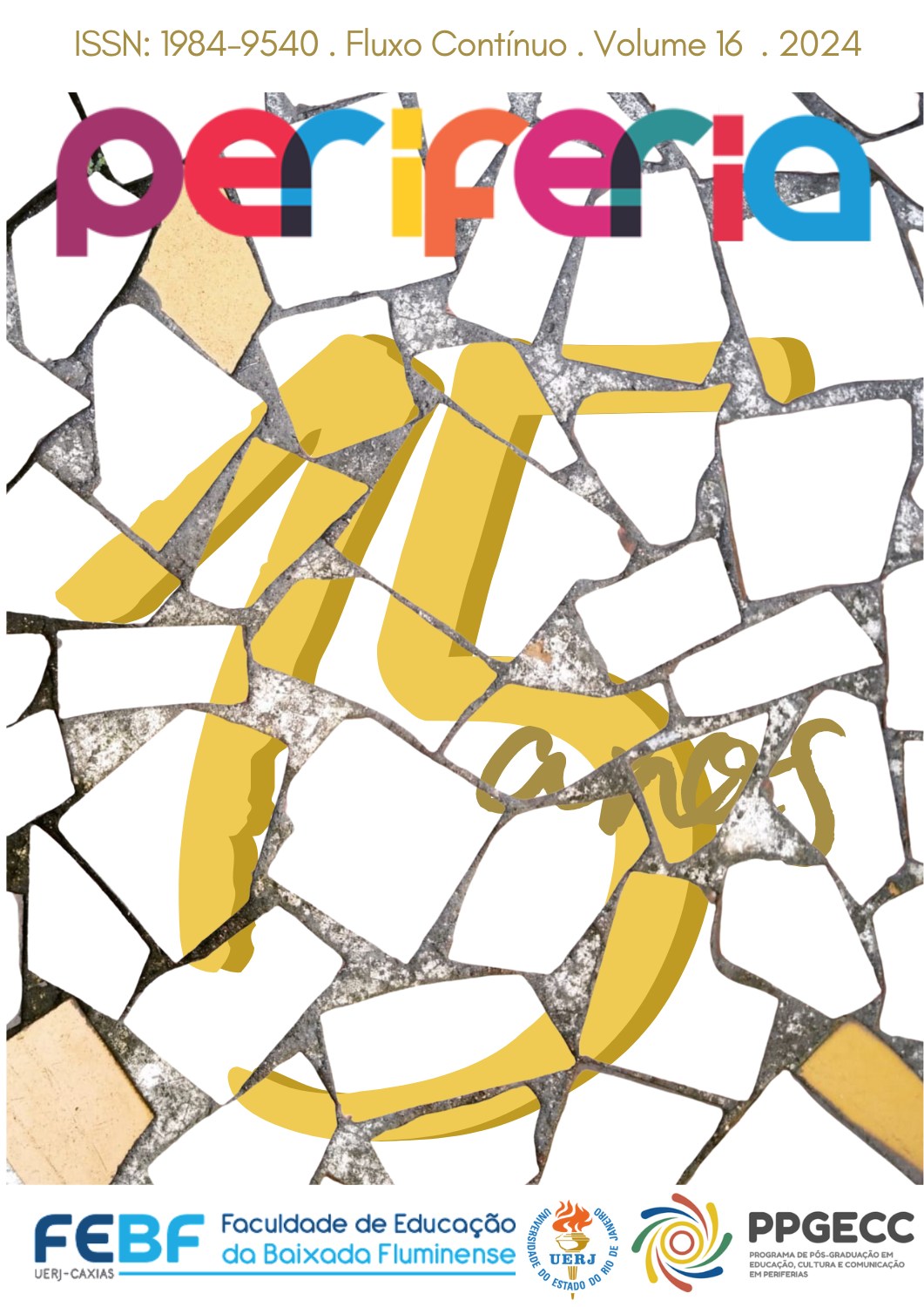LÍNGUA PORTUGUESA E SOFTWARE LIVRE:
Scratch e o desenvolvimento da criatividade no Ensino Fundamental
DOI:
https://doi.org/10.12957/periferia.2024.82188Palavras-chave:
Educação Problematizada, Língua Portuguesa, Pensamento Crítico-emancipatório, Scratch, Software LivreResumo
Este trabalho busca investigar as contribuições do uso do Scratch para o Ensino de Língua Portuguesa no Ensino Fundamental, principalmente no que diz respeito à promoção da liberdade de expressão e o compartilhamento de conhecimentos. Trata-se de uma pesquisa básica, desenvolvida por meio de pesquisa bibliográfica, que foi posta em prática por meio de um levantamento detalhado baseado nos pensamentos de Richard Stallman, criador do conceito de Software Livre, além de contar com as contribuições de Freire, Libâneo e Bagno que auxiliam para que essa discussão seja contextualizada sócio, política e economicamente. A abordagem qualitativa também foi utilizada como fundamento, porque analisa as relações, opiniões e discursos presentes nas principais documentações que envolvem essa temática por meio da interpretação e exame crítico dos textos consultados. Como resultados, evidenciou-se que o uso de software livre pode recuperar computadores inutilizados e restaurá-los, proporcionando a revitalização do laboratório de informática para o uso de programas com fins educativos e livres no ensino de Língua Portuguesa; percebeu-se que o computador e o uso do software livre ainda são pouco adotados dentro dos procedimentos de alfabetização e/ou ensino de Língua Portuguesa; a Língua Portuguesa auxiliada pela utilização de softwares será uma ferramenta que potencializa alguns aspectos que são exigidos pela vida em comunidade nos dias atuais: autonomia, autoestima, criatividade, iniciativa, raciocínio lógico e produtividade.
Referências
BAGNO, Marcos. Pesquisa na escola: o que é como se faz. 18ª ed. São Paulo: Loyola, 2009.
BLOG SOFTWARE LIVRE NA EDUCAÇÃO. Scratch Apresentação, 2021. Disponível em: https://www.ufrgs.br/soft-livre-edu/scratch-apresentacao/. Acesso em: 24 jan. 2024.
BONILLA, Maria Helena Silveira. Software Livre e Educação: uma relação em construção. Disponível em: https://periodicos.ufsc.br/index.php/perspectiva/article/download/2175-795X.2014v32n1p205/pdf_25/124693. Acesso em: 04 mai. 2024.
BRASIL. Ministério da Educação e Cultura - MEC. (2018). Base Nacional Comum Curricular – BNCC. Disponível em: https://www.alex.pro.br/BNCC%20L%C3%Adngua%20Portuguesa.pdf. Acessado em: 04 mai. 2024.
CASTRO, Adriane de. O uso da programação Scratch para o desenvolvimento de habilidades em crianças do ensino fundamental. Dissertação (Mestrado em Ensino de Ciência e Tecnologia). Universidade Tecnológica Federal do Paraná, Ponta Grossa, p. 126, 2017.
COELHO, Wilson Ferreira (Org.). Psicologia do Desenvolvimento. São Paulo:
Pearson Education do Brasil, 2014.
FERREIRA, Juliano Gomes. Vantagens na relação Software livre x Educação. In: Anais do Congresso Nacional Universidade, EAD e Software Livre, UFMG, 2010.
FERREIRA, Maria Adenilsa Batista. Jornal Impresso na EJA: alfabetização por meio da notícia e reportagem. 1ª ed. Curitiba: Appris, 2019.
FIGUEIREDO, Daniel Augusto de. História da educação Popular: uma leitura crítica. In: ASSUMPÇÃO, Raiane. Educação popular na espectativa freiriana. 1ª ed. São Paulo: Editora e Livraria Instituto Paulo Freire, 2009.
FREIRE, Paulo. Pedagogia da autonomia: saberes necessários à prática educativa. 51ª ed. Rio de Janeiro: Paz e Terra, 2015.
GNU.ORG. O que é o software livre?, 2012a. Disponível em: https://www.gnu.org/philosophy/free-sw.pt-br.html. Acesso em: 28 jan. 2024.
GNU.ORG. Software Livre e Educação, 2012b. Disponível em: https://www.gnu.org/education/education.pt-br.html. Acesso em: 29 dez. 2023.
LIBÂNEO, José Carlos. Conteúdos, formação de competências cognitivas e ensino com pesquisa: unindo ensino e modos de investigação. Cadernos Pedagogia Universitária, USP, 2009. Disponível em: http://www.prpg.usp.br/attachments/article/640/Caderno_11_PAE.pdf. Acesso em: 28 dez. 2023.
MONTANÉ, Fermín Alfredo Tang; SILVA, Aline Marcelino dos Santos. O Uso do Scratch para Produção Textual no processo de Ensino e Aprendizagem. In: Anais do XIII EVIDOSOL e X CILTEC, 2016.
PINTO, Cláudio da Costa; PRETTO, Nelson. Tecnologias e novas educações. Disponível em: https://www.scielo.br/j/rbedu/a/4vpwVbvgbkFRLRq4BPqzFHf/?lang=pt&format=pdf. Acesso em: 04 mai. 2024.
SCRATCH. Scratch. Disponível em: https://scratch.mit.edu/. Acesso em: 22 jan. 2024.
STALLMAN, Richard. Por que escolas devem usar exclusivamente software livre. GNU.ORG., 2021. Disponível em: https://www.gnu.org/education/edu-schools.html. Acesso em: 30 jan. 2024.
Downloads
Publicado
Como Citar
Edição
Seção
Licença
Autores que publicam nesta revista concordam com os seguintes termos:- Autores mantém os direitos autorais e concedem à revista o direito de primeira publicação, com o trabalho simultaneamente licenciado sob a Creative Commons Attribution License que permitindo o compartilhamento do trabalho com reconhecimento da autoria do trabalho e publicação inicial nesta revista.
- Autores têm autorização para assumir contratos adicionais separadamente, para distribuição não-exclusiva da versão do trabalho publicada nesta revista (ex.: publicar em repositório institucional ou como capítulo de livro), com reconhecimento de autoria e publicação inicial nesta revista.
- Autores têm permissão e são estimulados a publicar e distribuir seu trabalho online (ex.: em repositórios institucionais ou na sua página pessoal) a qualquer ponto antes ou durante o processo editorial, já que isso pode gerar alterações produtivas, bem como aumentar o impacto e a citação do trabalho publicado (Veja O Efeito do Acesso Livre).







